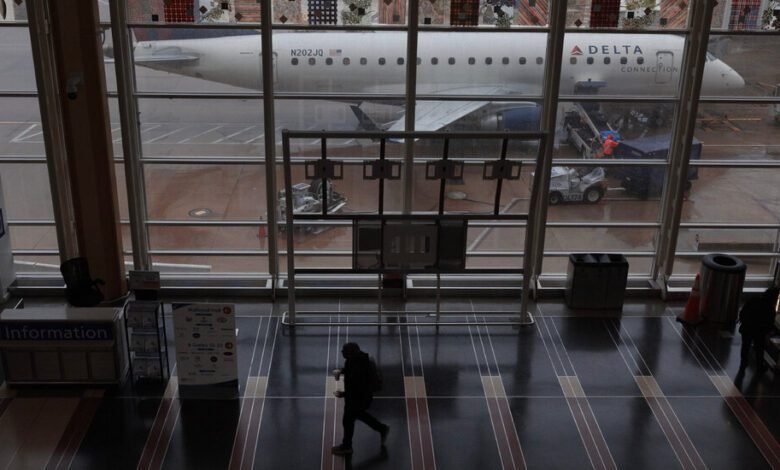Senate rushes to pass bill to reauthorize the FAA and improve air travel

The Senate is racing against a Friday deadline to pass legislation to reauthorize the Federal Aviation Administration at a time of intense uncertainty and disruption to the air travel system, but a series of political disputes and unrelated issues threaten to prolong the debate.
As one of the few remaining bills considered a must-pass item this year, the FAA package has become a magnet for dozens of amendments and policy proposals that lawmakers are scrambling to vote on, which has slowed its progress in the Senate. Regional interests have also altered the usual political alliances among legislators, making rapid action more complicated.
“We all need to work constructively and urgently to finish the work on the FAA,” Sen. Chuck Schumer of New York, the majority leader, said on the Senate floor Wednesday. “No one, absolutely no one, should want us to exceed the deadline. This would unnecessarily increase the risks for so many travelers and so many federal employees.”
The bill, which would reauthorize the agency for the next five years, would provide more than $105 billion to the FAA and another $738 million to the National Transportation Safety Board for airport modernization, technology and security programs. It would also strengthen the hiring and training of air traffic controllers, codify airlines’ reimbursement obligations to passengers, and strengthen protections for passengers with disabilities.
The legislation is a bipartisan compromise negotiated over months by Senate and House committees with jurisdiction over the FAA, after Congress authorized several short-term extensions of the agency when lawmakers failed to meet previous deadlines. The House passed its version of the bill nearly a year ago in a lopsided 351-69 vote.
“To get the FAA done, we need haste and a common desire to get to yes,” Schumer said Wednesday. “Any member who insists on extraneous changes will only increase the likelihood of us missing the deadline.”
With the legislation threatening to stall, the House on Wednesday approved a one-week extension before leaving Washington over the weekend. But it was unclear whether the Senate would be able to follow suit before the deadline, and leaders continued to push for a long-term review.
The debate comes at a time of great uncertainty about the aviation system, which has recently seen a wave of worrying episodes, such as dangerous near-collisions on runways, plane breakdowns and thousands of flight delays and cancellations.
Senate leaders have scheduled a key test vote for early Thursday afternoon that will determine how quickly the bill can move forward.
Sen. Ted Cruz of Texas, the top Republican on the Commerce Committee, said the Senate had “a very good prospect of passing the bill” by Friday and that he expected “a strong bipartisan vote later in the day.”
“That’s what I would like to see happen,” he said. “This is a bill that incorporates hundreds of priorities from members on both sides of the aisle, makes real strides in terms of increasing safety, in terms of investing in air traffic controllers to reduce delays.”
Senators maintain the advantage as time passes in a body that requires 60 votes to break a filibuster. They have introduced dozens of amendments to the bill that they want Senate leaders to put up for a vote. Some proposals concern the aviation system, while others are entirely separate pieces of legislation that proponents want to add to the FAA bill to increase its chances of passage.
One of the most intense regional fights has been over a provision in the bill that would add five round-trip flights from Ronald Reagan National Airport outside Washington, DC. Proponents, which include Delta Air Lines, have said they want to expand access to the nation’s capital and increase competition.
But the proposal angered lawmakers representing the region, who argued that the airport maintains the busiest runway in the country and cannot support additional flights. Senators Tim Kaine and Mark Warner of Virginia and Benjamin L. Cardin and Chris Van Hollen of Maryland, all Democrats, introduced an amendment to block the new flights. If they do not receive a vote on their proposal, Kaine and Warner on Thursday threatened to oppose quick approval of a one-week extension, which they said would allow leaders to run out procedural time on the broader package without allowing any vote on amendment.
Another group of senators was pushing for a vote on their bipartisan proposal to halt the expansion of the Transportation Security Administration’s facial recognition technology at airports and restrict it where it is in use.
Senators also proposed adding a number of unrelated policy ideas.
Senator Josh Hawley, Republican of Missouri, demanded a vote on his bill that would expand eligibility for federal compensation to the group of people harmed by exposure to the nation’s nuclear weapons program. (The Senate passed the bill in March, but the House did not approve it.) He also promised to block quick passage of an extension if his measure did not receive a vote.
Cardin and Van Hollen wanted to add a bipartisan measure to allow the federal government to fully fund the replacement of the Francis Key Scott Bridge in Baltimore, which collapsed in late March.
Senators Richard J. Durbin of Illinois, the No. 2 Democrat, and Roger Marshall, Republican of Kansas, wanted to attach their legislation related to credit card competition.
And Senators Marsha Blackburn, Republican of Tennessee, and Richard Blumenthal, Democrat of Connecticut, sought to attach the Children’s Online Safety Act, which would require social networks to take “reasonable steps” to prevent harm to minors on their sites.
Senate leaders pointed to an overwhelming vote last week, 81-10, to begin consideration of the legislation as a sign of momentum and consensus around the measure. But they were still working Thursday to secure a deal that would speed up the process, and the path to approving the short-term extension was unclear.
Sen. John Thune of South Dakota, the No. 2 Republican, said Wednesday that it seemed “increasingly unlikely” that a deal could be reached but that “there is always hope.”
“Everyone has it under control now,” he said. “Whether they will be fully exercised or not remains to be seen.”
Any major changes the Senate makes to the measure would undermine the House, where leaders have urged their colleagues across the Capitol to block unrelated provisions from entering.
The bill is a “carefully negotiated package, and support for the package could be compromised if the Senate begins to unravel key components of the deal or add legislation completely unrelated to the package,” said Justin Harclerode, a spokesman for the Republicans. in the House Transportation Committee. . He added that the policies could “complicate their passage in the House.”
Air travel industry participants called for quick passage of the bill to address a number of critical issues in the system and to provide the FAA with long-term operational security.
“A4A supports the swift passage of the agreed-upon bipartisan, bicameral language that was released Sunday night after months of careful negotiations,” Airlines for America, a trade group, said in a statement. “Strange and irrelevant amendments threaten this bill that must be approved amid the imminent deadline of May 10.”
“We urge Congress to approve the FAA reauthorization agreement without delay,” Sara Nelson, president of the Association of Flight Attendants-CWA, AFL-CIO, said in a statement. “This agreement will stabilize the FAA and provide it with the resources necessary to ensure that America’s aviation system continues to be the gold standard for safety, security and connectivity.”




